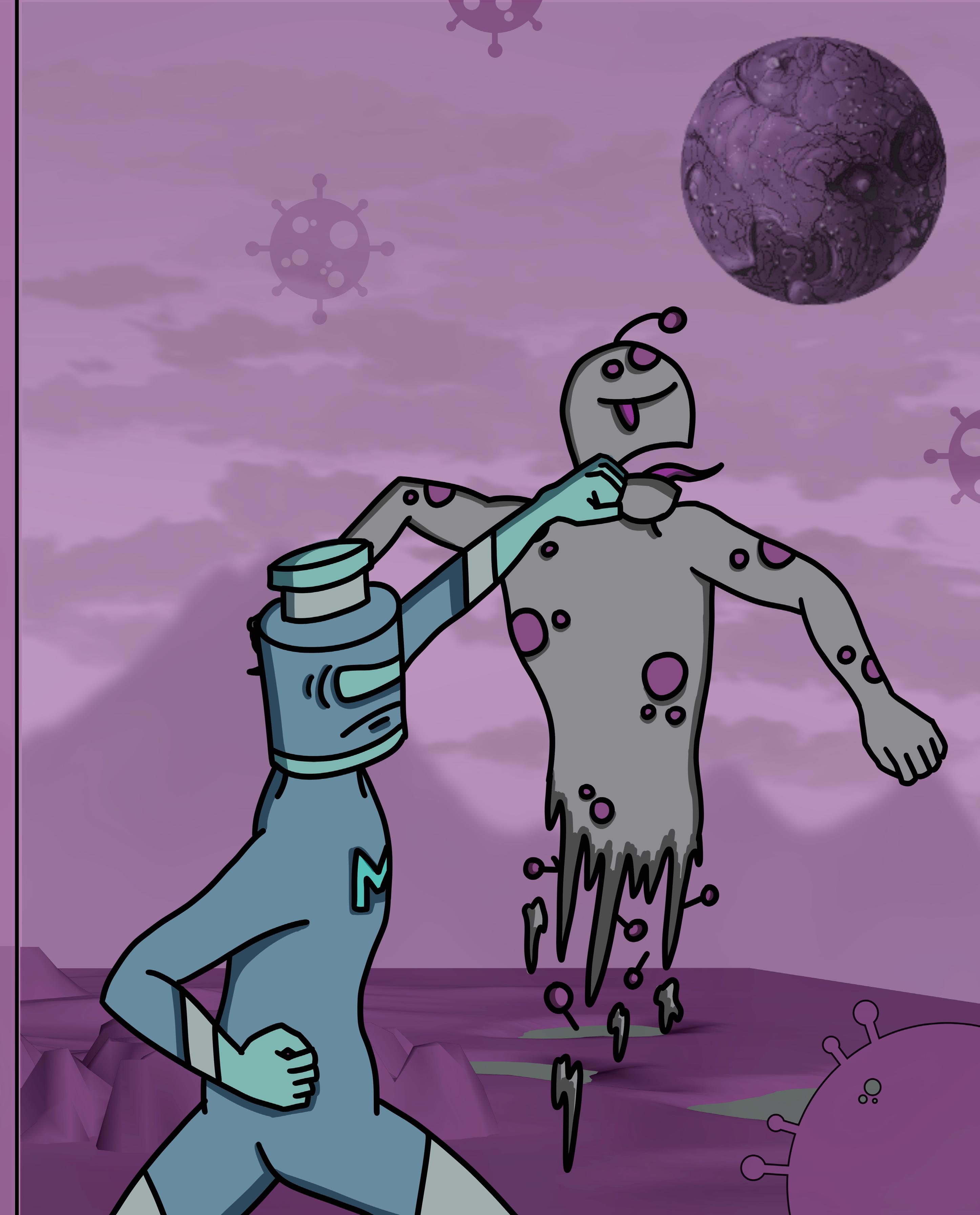
6 minute read
A Healthier Tomorrow
College students grieve the experiences they’ve lost to the COVID-19 pandemic, but readily available vaccines offer a spark of hope for the future. By: Page Shields
For the past two years, students across the country have watched their college experience slip away before their eyes. Upperclassmen reflect on their favorite memories — memories of travel, parties, concerts and conferences — while newer students can only wonder what moments the COVID-19 pandemic has kept from them. Cafeteria take-out boxes, Zoom performances and fully-remote courseloads make up a new normal the public never could have anticipated — and yet, this is the reality of higher education during the coronavirus crisis.
Advertisement
Though Millikin University has remained open since its original shutdown, the college has not gone untouched by the pandemic. In the fall of 2021, members of Millikin’s campus community suffered 164 cases of COVID-19. Compared to national statistics — the daily case count surpassing 1 million in January of 2022 — the number may not seem high, but in a student body of approximately 2,000, almost 200 is not to be overlooked. And as cases soared even higher across the country, Millikin was no exception. Entry testing for the spring 2022 semester alone resulted in 132 cases, with an 8.2% positivity rate.
Of course, neither Millikin’s administration nor its students sat back, watching idly as the case count ticked upward. Guidelines rapidly changed to match those of the Centers for Disease Control and Prevention. Some of Millikin’s rules included a “no visitors” policy for Greek housing, an approval requirement from the Office of Campus Life before hosting gatherings, and the closing of the university’s communal dining room.
As soon as vaccination opened up to those age 18 and older, Millikin encouraged students to take advantage. The school began hosting regular pop-up clinics in the University Commons to offer immunity to as many campus community members as possible. The student body responded enormously, with 84% receiving at least one dose of the vaccine by the start of the spring 2022 semester.
Luke Leach of the Macon County Health Department has helped to facilitate these clinics on Millikin’s campus. A Decatur resident all his life, Leach was originally hired as a contact tracer. He has been ensuring that Millikin students have vaccines available to them since the school’s first pop-up clinic in 2021. “These vaccine clinics, generally, people are very grateful for the opportunity to get vaccinated because we’re able to help offer them protection against the virus,” he says. “We’re all trying our best to fight this pandemic.” He considers helping people protect themselves from the virus to be the most rewarding part of his job.
But as we have unfortunately come to learn, vaccines aren’t going to eliminate the pandemic on their own. Sophomore Joe Goodwin contracted COVID-19 in December 2021, despite being vaccinated


against the virus. Though inoculation didn’t protect him from infection, Goodwin is still grateful for his vaccine. “I’m really glad I was vaccinated before I tested positive because my symptoms never got any worse than a common cold,” he says. Many facing the virus without a vaccine in their favor have not been so lucky — according to the CDC, the unimmunized have proven 15 times more likely to die of COVID-19.
Thanks to readily-available vaccines from pop-up clinics and local pharmacies, though, the worst most COVID-positive Millikin students have had to face is the discomfort of the isolation period. Goodwin spent six days in Walker Hall, the university’s designated isolation housing, before returning home to finish riding out the virus. He describes his time in his isolation room as “not the most comfortable.” Between the illness and Walker Hall’s faulty heating, Goodwin was happy to recover and leave Millikin’s isolation housing.
Despite their original enthusiasm about combating the virus, though, many Millikin students are now slipping behind in the public health fight against COVID-19. With the outbreak of new variants in the past months, the CDC updated their guidelines to include a third “booster” dose in the definition of “fully vaccinated.” At the start of the spring 2022 semester, only 18% of students had received this booster dose.
The low percentage may be caused in part by the growing epidemic of misinformation that has spread across the country. The Macon County Health Department has witnessed this problem firsthand in Decatur. “The spread of misinformation has been especially challenging, just because there is correct information out there, but people are quick to dismiss it,” Leach says. What does he recommend to those still facing vaccine hesitancy? “Trust the scientists. You might see one or two that spread the misinformation, but the bulk of them that really follow the science say you need the vaccine. It’s the best way to fight this pandemic.”
Millikin’s campus has felt the effects of this dangerous mindset. Logan Mulholland, a sophomore at Millikin, observed these impacts firsthand. “I know students who are exposed to COVID, and when they don’t get a call from the contact tracer, they think it’s safe to go out. It jeopardizes the safety of all of us,” he says. With the rise in new, dangerous variants, relying solely on leadership will not protect the public — it has become an individual responsibility equally as much. “To keep the campus open, we all need to be stricter about exposure,” Mulholland says.
While the COVID-19 pandemic is far from over, some experiences are safely returning. Gwen Klinkey, a junior professional writing and literature double major at Millikin, helped to bring back one of the English department’s favorite traditions this past October in a COVID-safe Halloween celebration. Poe in the Pit is an annual event typically hosted by the English Club. But when Millikin’s campus shut down in 2020, scattering its members across the country, the club virtually dissolved.
After an informal Zoom version of the event in 2020, Klinkey heard her peers wondering what had happened to the tradition. “Since I had run it once before, I talked to Dr. [Michael] O’Conner and asked if that was something that I could do, and both he and Dr. [Tony] Magagna wanted to see English Club and Poe in the Pit active again,” she says. In October 2021, Klinkey and the English Club hosted the first in-person Poe in the Pit in two years outside of the newly-built Center for Theatre and Dance, drawing in students from across all disciplines with snacks, cider and spooky readings of Edgar Allan Poe’s work.
Even as COVID-19 persists across the country, Millikin’s campus is filled with students making the most of their college experience. According to the Macon County Health Department, vaccination is the key to reclaiming that experience. Does Leach recommend the vaccine for everyone here on campus? “Oh, absolutely,” he says. As the winter months melt into a warmer spring and vaccines become more accessible, hopes are high that Millikin students’ experiences will only get better.










